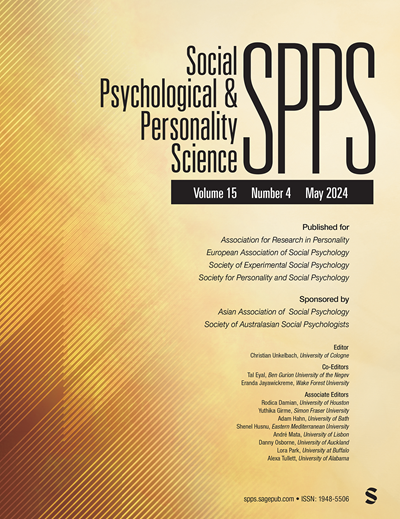文化悲观与怀旧的政治意识形态差异反映了人们对本民族历史发展的评价
IF 3.3
2区 心理学
Q1 PSYCHOLOGY, SOCIAL
引用次数: 1
摘要
西方保守派比自由派更关注过去:他们经历了更强烈的文化悲观主义,怀念过去的社会。我们通过比较美国和日本的意识形态差异来检验这种意识形态差异反映长期国家历史发展的假设。利用档案数据,研究1证实,尽管美国社会在上个世纪向自由方向发展,但土耳其社会最近转向了更大的保守主义。与预测一致,研究2和研究3表明,与美国相比,政治意识形态与文化悲观主义之间的关系在日本是相反的。在这两项研究中,与美国相比,意识形态与对过去的怀念之间的联系虽然没有逆转,但在日本却减弱了(甚至基本上被阻断了),这在一定程度上与预测一致。总之,这些发现表明悲观和怀旧的意识形态差异至少部分地反映了国家历史发展的客观差异。本文章由计算机程序翻译,如有差异,请以英文原文为准。
Political-Ideological Differences in Cultural Pessimism and Nostalgia Reflect People’s Evaluation of Their Nation’s Historical Developments
Western conservatives are more focused on the past than are liberals: They experience stronger cultural pessimism and nostalgically yearn back for past society. We test the hypothesis that this ideological difference reflects long-term national-historical developments, by comparing ideological differences in the United States and Türkiye. Using archival data, Study 1 confirms that whereas U.S. society over the last century moved in a liberal direction, Turkish society recently shifted toward greater conservatism. Consistent with predictions, Studies 2 and 3 show that the relationship between political ideology and cultural pessimism is reversed in Türkiye, compared with the United States. Partially consistent with predictions, in both studies, the link between ideology and a nostalgic yearning for the past is attenuated (and essentially blocked) in Türkiye, although not reversed, compared with the United States. Together, these findings suggest that ideological differences in pessimism and nostalgia reflect, at least partially, objective differences in national-historical development.
求助全文
通过发布文献求助,成功后即可免费获取论文全文。
去求助
来源期刊

Social Psychological and Personality Science
PSYCHOLOGY, SOCIAL-
CiteScore
12.50
自引率
1.80%
发文量
77
期刊介绍:
Social Psychological and Personality Science (SPPS) is a distinctive journal in the fields of social and personality psychology that focuses on publishing brief empirical study reports, typically limited to 5000 words. The journal's mission is to disseminate research that significantly contributes to the advancement of social psychological and personality science. It welcomes submissions that introduce new theories, present empirical data, propose innovative methods, or offer a combination of these elements. SPPS also places a high value on replication studies, giving them serious consideration regardless of whether they confirm or challenge the original findings, with a particular emphasis on replications of studies initially published in SPPS. The journal is committed to a rapid review and publication process, ensuring that research can swiftly enter the scientific discourse and become an integral part of ongoing academic conversations.
 求助内容:
求助内容: 应助结果提醒方式:
应助结果提醒方式:


